Things You Didn’t Know About D&D 5e: Preparing Spells
I recently discovered that I—and many others—had been wrong about a major part of the spell preparation mechanic. As such, I’m starting a semi-regular series called “Things You Didn’t Know About D&D 5e” which will endeavour to keep people informed.
Many of you who have perused my posts can probably guess which class is my favourite. If not, I’ll give you a hint: it starts with “w-” and ends with “-izard”. To me, magic is what makes the difference between fantasy and fiction, and the wizard is my idea of the most eminent spellcaster. My very first character was a wizard, and the class will always have a special place in my heart.
Much of my frustration with D&D comes about because I perceive there to be too heavy an influence of the works of Jack Vance. I’ve probably mentioned my hatred for his system of magic in half the posts I’ve made to this blog, if not more. The problems are inherent to every facet of magic in D&D—why doesn’t a wizard who knows fire bolt automatically know scorching ray, when they’re pretty much the same thing and he’s done the first one dozens or even hundreds of times? Because Jack Vance. Why can’t a wizard who knows control water use a very minor manifestation of that magic to gather up the contents of her water skin to douse the campfire without having to burn a 4th-level spell slot? Because Jack Vance. Why do we even have named spells (especially dumb ones like prismatic spray) which are always cast the same way as opposed to a pool of magic with which a caster might shape each individual spell? Because Jack Vance. It was to my great delight to find that the 5th edition wizard no longer forgot spells upon casting them; they didn’t have to prepare fireball multiple times if they intended to cast it more than once, they simply had to have it prepared. While spell slots still existed, it was a victory. It was like we had finally told Jack Vance to get his grubby fingers out of our fantasy. However, I recently discovered that there was another benefit to this that I had not been aware of.
The reason for this post is because I realize that some of my homebrew rules have been labouring under a false assumption predicated on this misunderstanding, and I’m giving fair warning that I’ll be going back and editing things. To help illustrate the false assumption I’m referring to, I’ll give you the rules for preparing and casting spells, as found on page 114 of The Player’s Handbook:
The Wizard table shows how many spell slots you have to cast your spells of 1st level and higher. To cast one of these spells, you must expend a slot of the spell’s level or higher. You regain all expended spell slots when you finish a long rest.
You prepare the list of wizard spells that are available for you to cast. To do so, choose a number of wizard spells from your spellbook equal to your Intelligence modifier + your wizard level (minimum of one spell). The spells must be of a level for which you have spell slots.
For example, if you’re a 3rd-level wizard, you have four 1st-level and two 2nd-level spell slots. With an Intelligence of 16, your list of prepared spells can include six spells of 1st or 2nd level, in any combination, chosen from your spellbook. If you prepare the 1st-level spell magic missile, you can cast it using a 1st-level or a 2nd-level slot. Casting the spell doesn’t remove it from your list of prepared spells.
You can change your list of prepared spells when you finish a long rest. Preparing a new list of wizard spells requires time spent studying your spellbook and memorizing the incantations and gestures you must make to cast the spell: at least 1 minute per spell level for each spell on your list.
What I recently discovered is that there are some significant words missing from this section. I’ll quote them from the Wizard entry back in 3.5 (emphasis mine): “A wizard must study [their] spellbook each day to prepare [their] spells”. That’s right, unlike in 3.5, if you’re wakened in the morning by a pack of orcs breaking down your door, you don’t have to study your spellbook for three minutes in order to prepare fireball—at least, not if you had it prepared yesterday. It’s only if you didn’t have a spell prepared the previous day that you have to spend time preparing it. Put in other words: losing your spellbook doesn’t doom you to become (effectively) level 0 when you next wake up.
And it’s not just this way for wizards. No spellcasting class—not clerics, not druids, not paladins, no one—has to “re-prepare” their spells every day; they only have to spend 1 minute per spell level adding a new spell to their list of prepared spells for the day, if they choose to swap spells out for new ones.
I was already aware that casting a spell no longer removed it from your list of prepared spells, and that is reflected in all the homebrew material I have made. However, some of the other material needs to be updated. Most notably the Sorcerer Redux.
The other reason for this post is because I went to Reddit to confirm that I was reading the rules correctly with this new revelation, and I found that many other people were also surprised at the daily preparation mechanic being absent. By posting this clarification I hope to inform others who have been handling this class incorrectly.
Happy adventuring!
Arcane Emporium, Vol. 1
A strange sight enters town. The normally-bustling market has a new attraction in the form of Balthazar, a half-dragon bedecked in ostentatious attire and marketing items with many and varied magical properties. Hundreds are quick to line up to view his wares, many of which have never been seen before. Philters of luck and courage, phials of light and warmth, weapons that return when thrown, arrows that flare brilliantly when loosed, knives that neither dull nor rust, and many more. If Balthazar doesn’t have something to interest you this time, he can always take requests. Having plumbed the depths of ancient treasuries and perused the forgotten libraries of lost civilizations, the half-dragon is familiar with the fundamentals to create nearly any magical item, given time and, of course, an appropriate down payment. To see this month’s special attractions at the Arcane Emporium, click the link below!
Arcane Emporium is a catalogue of homebrew rules, weapons, spells, monsters, and much more. New volumes will be published at the end of each month with additional material. If you like what you see, please consider becoming a patron on my Patreon. This will help me to post regular content for everyone’s enjoyment.
Update – January 1, 2017: Adjusted the wizard’s weapon spell to make its damage keep up with other cantrips (with some built-in limitations to prevent abuse with the haste spell). Also changed the name to arcane weapon so as to be inclusive to all arcane spellcasters.
Update – January 4, 2017: Adjusted the arcane weapon spell, removing the crowd control elements and making them an arcane equivalent of the paladin’s Thunderous Smite.
A Better Sorcerer Redux
I previously did a redux of the sorcerer class for 5th edition, which you can find here. I was fairly happy with it after I put it up, but I recently found a wonderful service called the Homebrewery that really allowed me to go wild and do this properly. As such, this is the version of the class that I will hereby keep up to date based on play-testing and feedback that I receive.
If you’re too lazy to go and read the last version of the class, the TL;DR is this: I decided that the best way to resolve the issues I perceived with the enduring legacy of Vancian magic in D&D was to eliminate all trace of them by combining the wizard and sorcerer class into a single gestalt. Much of the document is simply a synthesis of sections from both class entries in the Player’s Handbook so as to avoid causing unnecessary complications. The most drastic changes are the elimination of spell slots in favour of spell points, the elimination of the need for spell components (but not spell focuses), and the addition of an arcane equivalent of a paladin’s “Divine Sense”. I plan to follow this document up with an updated spell list that includes spells from supplements and the healing spells that bards receive.
Click on the image to be taken to the PDF.
Update log:
— December 4, 2016, added the missing “Arcane Focus” sidebar and “The Universal School” Arcane Tradition. Inspiration for this new tradition came from Generalist Homebrew.
Image credits for the document:
Art Calavera, “Wizard Queen”.
Wizards of the Coast, “Venser”.
Wizards of the Coast, The Adversary, “Tiefling Wizard”.
Wizards of the Coast, “Hand and Eye of Vecna”.
Images used without permission, but with abundant appreciation.
A Theory of Ice and Fire
A villain is a hero of the other side.
The time has come. That is, the time to play the game of drones and follow everyone else’s obsession with analysing and predicting how George R.R. Martin’s epic fantasy series A Song of Ice and Fire will play out. Many of my friends are consistently amazed when I predict how a show or novel will play out based on my great familiarity with narrative conventions and tropes, so it will be an interesting exercise to examine a text that so ardently and effectively subverts its genre’s unwritten rules. Know that I write this post burdened by the knowledge that, when you theorise about A Song of Ice and Fire, you win or you die or you make another post later pretending that you knew differently all along.
While the figures, events, and even some of the names show great similarity to the Wars of the Roses in 15th-century England, Martin’s work, like any fantasy novel published after 1954, owes a great deal to J.R.R. Tolkien’s The Lord of the Rings. Martin himself has remarked about its influence as a defining text of the fantasy genre, and even referred to Tolkien as “my great model”. However, in a 2011 interview, Martin reflected his frustration with many aspects the narrative that Tolkien popularised:
Much as I admire Tolkien, and I do admire Tolkien — he’s been a huge influence on me, and his Lord of the Rings is the mountain that leans over every other fantasy written since and shaped all of modern fantasy — there are things about it, the whole concept of the Dark Lord, and good guys battling bad guys, Good versus Evil, while brilliantly handled in Tolkien, in the hands of many Tolkien successors, it has become kind of a cartoon. We don’t need any more Dark Lords, we don’t need any more, ‘Here are the good guys, they’re in white, there are the bad guys, they’re in black. And also, they’re really ugly, the bad guys. It is certainly a genuine, legitimate topic as the core of fantasy, but I think the battle between Good and Evil is waged within the individual human hearts. We all have good in us and we all have evil in us, and we may do a wonderful good act on Tuesday and a horrible, selfish, bad act on Wednesday, and to me, that’s the great human drama of fiction. I believe in gray characters, as I’ve said before. We all have good and evil in us and there are very few pure paragons and there are very few orcs. A villain is a hero of the other side, as someone said once, and I think there’s a great deal of truth to that, and that’s the interesting thing. In the case of war, that kind of situation, so I think some of that is definitely what I’m aiming at.
The late Nobel Prize laureate William Faulkner once said: “The only thing worth writing about is the human heart in conflict with itself”. We can see these words echoed in Martin’s sentiments. But there’s another side to this, as well, a side that rejects the need for the kind of conflict that is so central to the fantasy genre.
Martin’s opposition to violent resolutions has even shaped the decisions he’s made outside of his stories. During the Vietnam War, Martin’s philosophy on such conflicts led him to apply for conscientious objector status. He believed that war contributed nothing to either side of the conflict, and this sentiment is manifest in his books. These are some of the darkest works in the fantasy genre; Martin has made sure that his audience doesn’t forget how tragic war actually is. In fact, one could say that the evil of war is an underlying lesson written into the series’ narrative. Readers have lost any number of beloved characters through the many bloody pages of these books because of violent conflict, and it is certainly no accident that Martin places his story in a feudal society, where the accumulation of power was paramount for one’s very survival, making conflict inherent to everyday life.
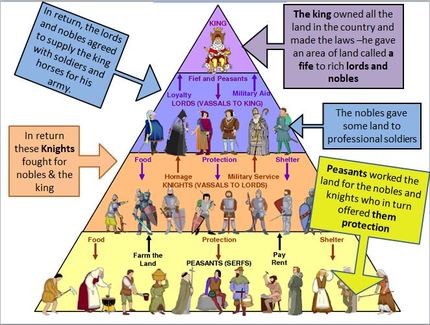 The basic elements and relations of feudal English society, similar to that of Martin’s Westeros.
The basic elements and relations of feudal English society, similar to that of Martin’s Westeros.
It is important to remember Martin’s philosophy on conflict when considering how the trials facing the Seven Kingdoms might unfold. Time and again, Martin has demonstrated how war has done nothing to help either side. It is unlikely, then, that the ultimate conflict of the series will be resolved by a battle of good and evil on the open field, winner take all. It is far more likely that, after everyone is bled dry, we will see a truce.
That resolves the How, but what about the Who?
Martin has said that the ending of the series will be “bittersweet”. Immediately, that excludes outcomes that favour people like Cercei Lannister or Ramsay Bolton. As much as Martin has endeavoured to show that good and evil exist in everyone, these two characters have been shown to be utterly irredeemable. But, as much pleasure as his readers will derive from those two meeting their ends, there is heartbreak to come with the outcome we are given. This means that we will be forced to choose, and in this I am reasonably certain as to who the sides will be.
Many people believe that the final conflict in the series will be against the Others, that the war for the Iron Throne will be resolved in order to allow humans to present a unified front against a war that transcends petty politics and threatens the world. Certainly, Martin has foreshadowed this conflict since the start of the series. Winter is coming, we have heard time and time again. In A Game Of Thrones, Old Nan explains it to Bran Stark:
[T]he winter, my little lord, when the snows fall a hundred feet deep and the ice wind comes howling out of the north, when the sun hides it face for years at a time, and little children are born and live and die all in darkness
The problem with this prediction, of course, is that it goes back to how Martin doesn’t want to write another Lord of the Rings. He doesn’t want a story about good guys and Dark Lords, he doesn’t want a story where problems are solved with war. No, Martin has served his readers up a red herring with the Others, the Long Night, and Azor Ahai. In fact, I’m sure that we have everything all wrong about that conflict. The Others, I believe, raised the Wall, and they did it to withstand an invasion by humans. Consider which party is more likely to have raised a 700-ft wall of ice: Brandon the Builder, the mythical progenitor of House Stark, or actual ice creatures?
But I digress, while the conflict with the Others is a significant affair, its ultimate purpose is to distract the reader from properly appreciating the stakes at risk south of the Wall. It is the struggle for the Iron Throne that is the central conflict of the series, and there can only be two characters that readers will be anguished to see fight over it, not only because they both deserve it, but because the ideal resolution is for them to co-operate rather than muster their banners.
The first of the two contenders was the least likely as of the first book. He was the consummate underdog, an outsider even to his own family. He had no place of his own, and so he went to join the ranks of those like him.
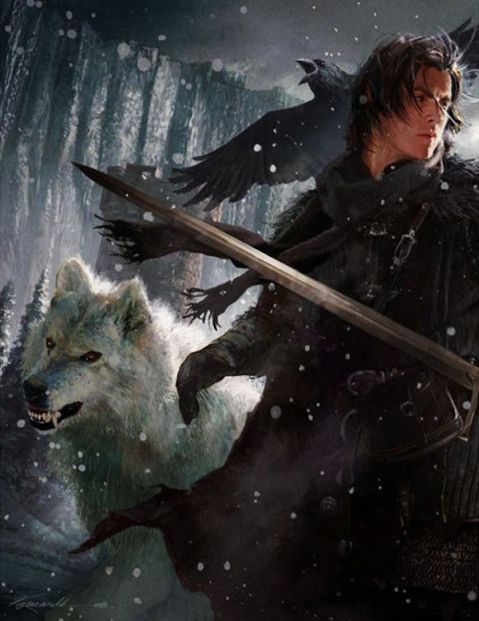 The 998th Commander of the Night’s Watch
The 998th Commander of the Night’s Watch
I speak, of course, of Jon Snow. I have thus far been hesitant to draw on the television series as evidence of any claims I propound here, but in the matter of Jon’s parentage the show merely was the first to reveal what everybody already knows: that Jon is not the bastard of Eddard Stark, but the child of his sister, Lyanna, and the Dragon Prince Rhaegar Targaryen. When David Benioff and D.B. Weiss entered discussions with Martin about producing the series, the one question he had to test whether they were genuine fans of the books was “Who are Jon Snow’s parents?” As Rhaegar’s son, Jon is the heir to the Iron Throne, and though he is unlikely to want it, there’s nobody else in Westeros with a better claim.
The second contender for the throne has been obvious since the first book. Yet, while the readers know her well, her nature hearkens back to Martin’s wise words “a villain is the other side’s hero”. Consider someone who has taken everything they have through war, who has crushed dissent with austerity, and who has displayed an unparalleled hunger for power?
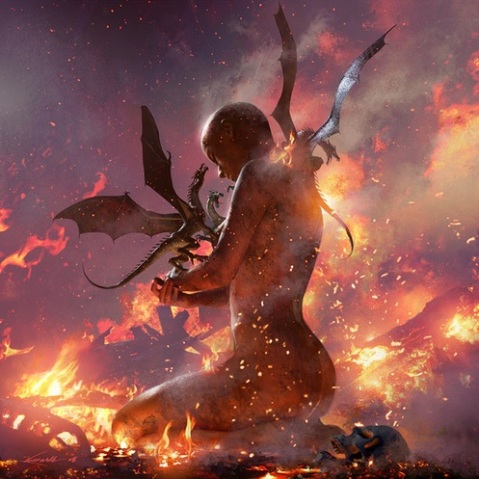 The Unburnt, Breaker of Chains, and Mother of Dragons
The Unburnt, Breaker of Chains, and Mother of Dragons
Readers must face a harsh truth when it comes to Daenerys Targaryen: she has been faithful to the her family words, Fire and Blood. Her activities in Slaver’s Bay have demonstrated just how much trouble Westeros will be in when she finally turns her fleet away from the smoking wreck that she has made of that region. The audience knows that her heart is in the right place, but her capacity for bloodshed has been demonstrated many times. How should the people of the Seven Kingdoms be expected to react to news that another Targaryen warmonger is sailing for King’s Landing to reclaim the Iron Throne and restore the harsh rule seen in the days of the Mad King? A Targaryen who crucified the old rulers of Mereen, set fire to Astapor, leads an army of eunuchs raised as slave soldiers, and rides dragons. Three dragons. Just. Like. Aegon.
It is news of her brutality that will have reached the Seven Kingdoms, not that her violent tendencies are directed exclusively at slavers. As much as readers may want to see Daenerys claim her birthright and usher in an era of unprecedented peace, an invasion of Westeros by this Targaryen scion has no possible happy ending. There will be fire and blood, and Jon Snow will be forced to oppose her.
And there you have it, my prediction for how the story will develop from here. I don’t know who will finally win the Iron Throne, but it will ultimately be a Pyrrhic victory for both the character and reader. Martin will make sure that everyone understands and regrets all the losses that were suffered getting to the resolution, and that we take away from the series that war isn’t worth the cost.
Personally, I would like to see Jon and Daenerys continue the morganatic traditions of Targaryen marriages (even though it’s kind of icky, it’s a tidy way to reach a resolution), and I’m hoping that we at least get to see one Dragons vs. Others fight before Martin’s anti-war sensibilities steer the plot away. I won’t hold out hope, though.
Image credit:
Feudal society – http://medieval-contol.weebly.com/how-does-it-work.html
Jon Snow. By Michael Komarck.
Daenerys, The Unburnt. By Michael Komarck.
5th Edition Improved Combat Variant
Combat is, undoubtedly, the cornerstone of a successful game of D&D. Of all the pillars that support an adventure, it is the one which players will most strongly consider when creating their characters. A character without any combat capability will be quickly found wanting by the measure of other adventurers.
However, in spite of the great significance of this element of the game, the rules of combat are woefully restrictive. Even fighters, martial champions who live as knights, royal guards, and elite soldiers, and who are trained in weapons that emphasize vastly different combat styles, do not automatically know how to lunge or parry without taking a specific subclass (Battle Master). The end result is … well, I’ll let the above image summarize my feelings on it.
It also means that melee characters are restrained to repeating the basic Attack action while spellcasters in the party are plumbing their arsenal of spells, shapeshifting forms, and other exciting abilities that make combat interesting. Playing a fighter can, at times, seem like an exercise in simply hitting what’s in front of you until it breaks. This variant is intended to provide greater substance to the combat experience for both fighters and other characters who may use melee attacks.
The document below is intended to expand on chapter 9, “Combat”, of the Player’s Handbook. The entries are additional options to consider when determining how you intend to use your turn’s various actions in combat.
Click the image to link to a PDF.
5th Edition The Sorcerer (Redux)
I have complained about this before (even in this very zine), and I have resolved that it is time to do something about it.
There are many idiosyncrasies in the fantastical conventions endorsed by Dungeons & Dragons. One of the most enduring lunacies, I have found, is that wizards can spend years learning spells only to forget them at the start of each day.
For the game’s first edition this was rather understandable; in the ’70s, when Dungeons & Dragons was first published, the fantasy world was dominated by such names as Jack Vance, whose fantasy series Dying Earth (1950) included wizards who were a lot like guns, loading themselves with spells like marksmen load their weapons with bullets. Even after decades of clever writers attempting to subvert this mechanic, however, Wizards of the Coast persists in maintaining this obtuse tradition.
There are any number of sensible reasons why the institution of Vancian magic ought to be torn down. Most obviously, and applicable across all conceptualizations of the nature of magic spells, people who constantly re-read the same material are going to remember it. The human capacity for memory is tremendous. Gavin Kostick, an Irish playwright, has committed the entirety of Joseph Conrad’s Heart of Darkness (1899)—all 36,000 words!—to memory, continuing a long tradition that dates back at least to Ancient Greece when poets would recite all 15,700 lines of the Iliad without even possessing a valuable, written copy of the text. Before the advent of the printing press, it was not at all uncommon for people to commit vast quantities of information, especially religious text, to memory. Yet, we know from careful perusal of the Player’s Handbook that, in 5th Edition, spell books are mundane tomes only about 100 pages long that can easily contain the entirety of a wizard’s repertoire, but still an accomplished wizard is, according to the rules for preparing daily spells, simply going to forget spells that he has prepared every day for decades. And, if he loses his spell book, he may as well give up on his craft!
Resolving this issue involves re-imagining the entire nature of the wizard class. What are spell books but memory aides, and what are the laws of magic but conventions that mortal minds have applied to a supremely powerful force? Moreover, how does a wizard who has no need of preparing spells differ from a sorcerer? My preferred resolution to the imbroglio of arcane traditions is to do away with the conventions that bind our preconceptions and make a bold revision: wizards are sorcerers, and sorcerers are wizards.
Below is my conceptualization of how 5th Edition should have put an end to this contentious, decades-old variance and unfettered the wizard from the yoke of Vancian tyranny. I have called this combined class “the sorcerer” for the sake of convention, because I feel that the resulting gestalt is closer in theme to the 3rd Edition sorcerer than to either of the 5th Edition wizard or sorcerer classes. You may choose to have it that, in your campaign, the conventional term for an arcane spellcaster is “wizard”, or even “mage”, based on your conception of social perceptions of individuals of this class. The sorcerer learns a certain number of spells every time they gain a level, and they can supplement this by learning from their peers, from scrolls they find in ancient ruins, or from a rival’s stolen grimoire. They can retain familiarity with a number of spells based on their level and Intelligence, but only need to consult their spell book if they intend to change their list of memorized spells.
As I indicated above, my reconciliation of the more bothersome conventions of magic into practical mechanics involves subverting many of the pre-existing tropes that apply unnecessary restrictions on the class. Therefore, as sorcerers are masters of magic, I felt it appropriate to bestow on them a more flexible spellcasting system in the form of the official spell point variant found in chapter 9, “Dungeon Master’s Workshop”, of the Dungeon Master’s Guide. I have approved of this system since it first appeared in 3rd Edition’s Unearthed Arcana, and I have been very vocal in the past that 3rd Edition’s psions were what wizards should have been.
Without any further ado, I present the Sorcerer (Redux).
Click the image to open the full PDF in a new tab.
5E Prestige Classes
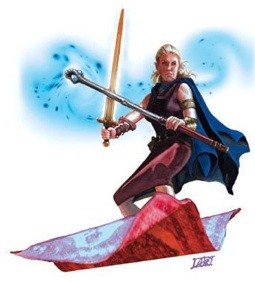
Prestige classes were introduced in 3rd Edition as a means to further individualize a character. They had prerequisites that could be met by characters of different classes, essentially acting like a more exclusive multiclassing option.
In 5th Edition, many of these prestige classes (such as the arcane archer and the eldritch knight) have become backgrounds or archetypes of the base classes listed in the Player’s Handbook. There are benefits and drawbacks to this approach; while it makes for greater diversity in the individual classes, it also, paradoxically, restricts player options. Rather than being able to balance their shapechanging and spellcasting abilities, for example, a druid is forced to either follow the circle of the land or the circle of the moon. A fighter must choose between learning useful combat manoeuvres through the battle master archetype or learning spells as an eldritch knight. A wizard used to be able to become an arcane archer after achieving a high enough base attack bonus. Now they have to multiclass several levels into rogue. Same thing for fighters and rangers who want to become assassins, and could previously do so with a clever distribution of skill ranks.
The result of these changes is that players are less easily able to subvert standard fantasy tropes and are, instead, pushed to make characters that conform to established archetypes. While I find that this is, by and large, a fair trade-off for the versatility 5th Edition characters generally gain anyway, some character options I have been playing with still require that characters not be restricted by their base class choice.
To illustrate my point, I present my take on 5th Edition prestige classes, complete with two prestige class options: the guild mage and the lycanthrope.
Dungeon Master Review: Murder In Baldur’s Gate
Baldur’s Gate stands on the brink. A city where class divisions are physically delineated by walls, separating the wealthy Upper City from the middle-class Lower City and the lawless Outer City, it is a powder keg of social strife and unrest. Now, an old threat is poised to spark an inevitable reckoning. Three leaders, desperately trying to protect the city they know, unknowingly avail themselves to the plot of a murdered god. As events spiral out of control, is there anyone who can stem the flow of blood?
Murder In Baldur’s Gate™ is the first issue of the Sundering Adventure series by veteran writers Ed Greenwood, Matt Sernett, and Steve Winter. Players are thrown into the midst of a tangled skein of plots, conspiracies, and social movements which threaten to tear apart one of Faerûn’s largest cities. Time and again, they are challenged to determine the lesser evil before a worst-case scenario unfolds.
If you played the Baldur’s Gate PC games, you will recognize a number of the supporting characters and references skilfully woven into the fabric of the city’s history and character. This enrichment of the setting can create a stronger emotional connection for the players familiar with the city’s legacy, but even players new to the city can be charmed by its complex nature. The module contains so much detail about Baldur’s Gate that it required a separate setting book twice the length of the actual adventure!
The events that transpire encourage players to quickly align themselves with one of the city’s prominent figures. Each represent a faction exerting influence over the city in its own way, and each have sensible motivations that can endear themselves to players. Duke Torlin Silvershield, scion of the most influential noble family in Baldur’s Gate, seeks to excise a cancer from the city’s leadership and restore prosperity; Ulder Ravenguard, Marshal of the Flaming Fist, struggles to keep order and maintain the status quo; and Rilsa Rael, the face of the “noble outlaw” Guild, aims to further the rights of Baldur’s Gate’s poor and disadvantaged. As the adventure progresses, each becomes more embittered toward their rivals and more radical in their methods. Unchecked, the consequences of their actions will change the city forever.
Gameplay
As mentioned above, there is an enormous amount of text to digest for this adventure. The adventure is 32 pages long, supplemented by a 64-page setting book that provides description and background for virtually any location in the city. Even for DMs with a special affection for a well-rounded setting, it can be a monumental task to remain aware of all the factors that may come into play as the players spread their efforts throughout the city. Furthermore, as all veteran DMs will know, no amount of preparation can ever fully account for player capriciousness, which can make for a lot of inconsequential reading. At one point, my players decided to force the issue of interrogating an NPC on a delivery from his establishment. The adventure book didn’t include possible responses the NPC would provide under duress, and I had to peruse another chapter of the adventure book (as well as several salient sections of the setting book!) in order to find all the information the NPC would reveal under threat of violence. While the sandbox-style of gameplay exemplifies the very best of Dungeons & Dragons, outside of a few randomly-located sidebars there is a troublesome absence of aids to help account for the various moving components of the myriad ongoing plots. Even a flowchart would have been helpful.
Additionally, for an adventure which evidently strives to provide all that a DM needs for any situation, there are no encounter maps. Even the opening fight of the module requires the DM to either recycle an encounter map from another adventure, or come up with something from scratch. Week after week that we ran this module the bulk of my prep time was spent splicing various elements from random maps to represent important areas. Because the quests are all so open-ended I had to use three wet-erase map mats to account for the possible choices of my players. On more than one occasion I had to declare a thirty-minute break while I came up with yet another map because they’d decided to do something entirely unexpected.
Player Feedback
A complaint that came back to me from my players was that they got “tired of the politics”. Frankly, this frustrated me, as I thought the conflicting social pressures were an excellent background to give reasonable motivation for player actions, and I wish that more Dungeons & Dragons campaigns were like this. The best villains, in my estimation, are the ones who represent what you could become if you valued ends before means. Nonetheless, I can understand how the subtlety of witnessing a “good guy” becoming a “bad guy” can be lost amid the feelings of confusion and betrayal that players will feel as people whom they supported as just slide into iniquity. Without a tangible enemy, the players can feel their efforts are merely in vain, and because some of the events in the adventure are unavoidable and pre-scripted I can somewhat agree. From behind the DM screen I had the benefit of the whole picture and a perspective on how every action prompted a reaction; my players felt they merely mitigated a complete disaster, leaving their victories rather empty. All said, however, they found the adventure worthwhile, and enjoyed finally putting down the ultimate foe.
Conclusion
This adventure is worth trying out to take a break from the ubiquitous “good vs. evil” campaigns. While intensive on the DM, it is rewarding to provide your players with an open-ended adventure experience. There will likely be aspects of the adventure that they love, and aspects that they hate. It took my party a little over two months to get through this adventure, playing once per week on average, so be prepared to emphasize the impact of their victories and accomplishments (as well as their failures) of your party along the way to keep them invested. It is especially important in this module that the players feel they are making a difference, otherwise they’re likely to get frustrated.
And don’t forget to have fun.
Post-Script [SPOILER ALERT!]
Below are the choices and outcomes my players experienced:
- They supported the Guild, seeking rights and recognition for the Outer City.
- They infiltrated the Flaming Fist on Rilsa Rael’s request when the Fist locked the Upper City down after dusk, and earned Ravenguard’s trust by closing down several remaining vice dens (in actuality, warning the proprietors via Guild contacts to vacate and set up somewhere more discrete).
- They failed Ravenguard’s task to peacefully convince Caldwell to turn down his nomination for Duke, instead prompting Duke Silvershield to issue a warrant for their inflicting violence on a patriar. Ravenguard refused to protect the players after this, and sent his officers after them to show that he did not sanction their actions.
- They were caught by authorities and sent to the Seatower of Balduran. One party member escaped arrest and, with the help of the Guild, organized a prison break.
- They killed Ravenguard in a demonstration-turned-riot, believing that he had ordered the guards to fire on the unarmed citizens.
- They investigated but failed to prevent the Smokepowder plot, which led to Duke Silvershield becoming the Chosen of Bhaal.
- They killed Silvershield at the Feast of the Moon, becoming the Heroes of the Wide twice over.
Did you run this adventure? Share your experiences in the comment section below! Remember to tag your posts with spoiler warnings!
Image credit: Wizards of the Coast
Dungeons & Dragons 5th Edition Homebrew Rules – Part 3: The Nature & Practice of Spellcasting
This is the third part of a series of homebrew rules for Dungeons & Dragons 5th Edition.
Exhibit 3: Spellbooks & Preparing Spells
This staple of the wizard class has always seemed to me to be more than simply a recipe book for spells. Surely the text isn’t as banal as “two dashes of bat guano, aged sixty-six days; a diamond worth at least 100 gp…” Perhaps I am biased in this regard because of my exhaustive experience studying textbooks (the closest analogy to a spellbook), and my notes for writing papers (an approximate analogy to spellcasting) are excerpts from various sources, exhaustively cited in what someone who has no experience in my academic field would find… well… arcane. Here is an excerpt from one of my university papers to demonstrate what I mean:
It is from Xenophon that we see our first approbation of the legendary law-giver Lycurgus in detail since the account of Herodotus.1 Any discussion of the “essential Sparta” immortalized in the Spartan mirage must needs include Lycurgus, central as he is to understanding the “ideal Sparta” as discussed by ancient sources. Lycurgus is almost invariably depicted as a paragon of Spartan virtues, a visionary reformer who set Sparta on a path to supremacy. So important were the Lycurgan reforms that the reason for Sparta’s eventual fall after the Battle of Leuctra, as Xenophon put it, was said to be that it was “manifest that [the Spartans] obey[ed] neither their god nor the laws of Lycurgus”.2 Yet, beyond his recognition as the traditional reformer of Sparta’s constitution, few details about Lycurgus are consistent across accounts. Plutarch perhaps most famously admitted:
Concerning Lycurgus the Lawgiver absolutely nothing can be said that is beyond dispute. His ancestry, his foreign travels, his death, and above all his activity concerning the laws and the constitution, all are reported differently. And there is the least agreement about the chronology of the man’s life3
While my exquisite prose is certainly sufficient to guide even an amateur historian through my complex assessment of ancient sources, few who haven’t done actual academic research (in Classics especially) will be able to follow the names and abstruse shorthand that goes into the citations. This is precisely how I imagine a wizard’s spellbook… notes which reference formulae and laws which the wizard will have experience with, compiled not so much as a series of instructions (a recipe of sorts) but a resource for a wizard to keep a spell’s mechanics fresh in their memory.
Of course, this is apparently not how Wizards of the Coast envisions spellbooks. The only official “fluff” that would align with this approach concerns adding spells to your spellbook from another source. From page 114 of the PHB:
Copying a spell into your spellbook involves reproducing the basic form of the spell, then deciphering the unique system of notation used by the wizard who wrote it.
The official concept of a spellbook appears to be pages and pages of complex “mathematical” proofs which a Wizard must memorize constantly, as they ultimately forget these details when they cast the spell. This is a system of magic known as “Vancian” after Jack Vance’s seminal fantasy series Dying Earth where mages effectively had to re-learn their spells every time they wished to cast them, as though they were a magic gun firing spells for bullets.
This cumbersome tradition is slowly becoming more streamlined in the vanilla rules. Wizards in 5th edition now no longer require perfect foresight in the spells they need for the day; they can prepare “x” number of spells and cast them as many times as they have open/applicable spell slots (instead of having to prepare, say, three Fireballs), but those spells are still their only selection until they spend time studying their spellbook again. Furthermore, most Wizard spells can be cast using higher spell slots for better results, allowing additional flexibility when it comes to using your total number of spell slots throughout the day. Nonetheless, Wizards are still locked into their selection, prompting issues which led to one of my favourite fourth-wall breaches by the webcomic The Order of the Stick:
Leeky Windstaff: You did not actually prepare any sonic energy spells today, did you?
Vaarsuvius: Not as such, no.
Leeky Windstaff: Truly, more wizards have been laid low by the writings of Jack Vance than by any single villain.
Vaarsuvius: On an unrelated note, would you consider a brief pause in the battle? Say, about eight hours or so?– The Order of the Stick, #345
My solution to this insanity involves rethinking the way that Wizards prepare their spells. In fact, it involves rethinking the way that Wizards develop and maintain their powers on a fundamental level.
Solution: Inherent Magical Abilities
This is an unpopular solution among the legions of players who insist that it is Sorcerers who are born with innate magic, while Wizards learn their abilities, but I’m the kind of person who thought midi-chlorians were a plausible solution to the central question in Star Wars. (You know, the “why the fuck isn’t EVERYBODY a Jedi?” question.) If Wizards can manipulate space and time, destroy entire armies with a few powerful spells, and even cheat death through arcane rituals to “live” on as sentient undead, the only plausible reason to not become a Wizard is because it’s against your faith. And, let’s be fair, if my faith has Wizards, and yours doesn’t, your faith is not going to last very long.
But I digress. My solution is not so exclusive that common people couldn’t learn the fundamentals of magic. In fact, the existence of such options as the Magic Initiate feat demonstrate that anyone talented enough can master the basics. I envision Wizards more like Willow from Buffy the Vampire Slayer. Early in the series, all of her friends, battle-hardened as they were (even Xander, that lovable dork) are able to contribute to the curse which restores Angel’s soul, but when they get into the process Willow’s prodigious natural talent manifests, and she takes over its completion on her own (S2E22). Willow would go on to become one of the most powerful witches in history. This involved Willow possessing something none of her peers possessed, and it became her greatest strength in the “Scooby Gang”.
In much the same way, not everybody has the “stuff” to be a wizard, even though they might learn to cast Light or Magic Missile. Furthermore, being a wizard requires a singular dedication. Unlike Sorcerers, who have boundless potential waiting for them to grow strong enough to wield it, Wizards develop their potential and strength in equal measure through careful study and constant practice. It’s a thematic distinction, but an important one for explaining the class’ mechanics.
Rethinking Spellbooks & Prepared Spells
A consequence of wizards possessing inherent magic abilities is that their spellbook is there as more of a resource than a crutch. In my solution, wizards don’t need to study their spellbook every day to physically prepare the same spells over and over; they need to study their spellbook to change their prepared spell selection and maintain practice with the spells they are already familiar with using. The maximum number of spells a Wizard can prepare in a day (your Intelligence modifier + your Wizard level) represents what they can remember without having to spend long periods of study re-familiarize themselves with the interaction of certain magical effects necessary to produce the desired result (ex. a conflagration of flames). When studying their spellbook to prepare daily spells, the number of minutes of study required per spell level is always 1. For example, rather than having to spent 9 minutes “re-preparing” the 9th level spell Wish, a Wizard would only have to spend 1 minute studying her spellbook to stay familiar with its complex formulae. Additionally, my solution allows for Wizards to swap out their prepared spells during short rests, rather than only after long rests. That way, if the party unexpectedly encounters monsters with specific weaknesses and immunities, the Wizard can use the time they spend regrouping in some fortified part of the dungeon to swap out some less applicable spells. The number of spells that can be swapped out during a short rest is equal to the Wizard’s Intelligence modifier. Swapping out your entire list of prepared spells can still only be done during a long rest.
Another notable consequence of this solution is that a Wizard whose spellbook is stolen or destroyed doesn’t wake up the next morning inexplicably unable to cast anything more than a cantrip. They wake up able to cast the same spells they could yesterday, with certain restrictions (see below).
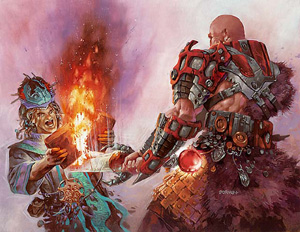
No longer a reason to “retire” your character to that farm where unwanted adventurers live happily ever after.
The most obvious restriction is due to eidetic memory having been scientifically discredited a myth (with possible exceptions such as John von Neumann). Even Wizards, with their practised abilities to focus, would start to forget minor details of complex formulae without constant study. For every day a Wizard goes without studying their spellbook, they lose 1d4-1 spells from their prepared list. This process continues until the Wizard creates another spellbook or they are left with only a number of prepared (“recalled”) spells equal to their Intelligence modifier. Because the higher the spell level, the more complex the formulae behind it, Wizards in this situation forget their highest level spells first. The only exception to this trend is if the highest level spell is from the school included in their Arcane Tradition (see PHB 115-119). For example, a 5th level Evoker who has lost his spellbook and whose only recalled 3rd level is Fireball would lose a lower-level spell from another school before he forgot Fireball. Additionally, spells that have been forgotten can be replaced in a new book (once you eventually obtain one) as though you were copying them from your old spellbook. For example, a Wizard who lost her spellbook and was re-learning the 7th level spell Fire Storm would need only spend 7 hours and 70 gp copying the spell from the new source, as opposed to 14 hours and 350 gp. See the “Your Spellbook” sidebar on PHB 114 for further rules regarding copying a spell into your spellbook.
The tyranny of Vancian magic has long stifled Wizards in Dungeons & Dragons, and these adjustments to the vanilla rules are intended to make the class more appealing both thematically and mechanically. Where before losing their spellbook would turn Wizards back to level 0 overnight, now they maintain utility based on innate competence and exhaustive practice. The days of contemplating throwing your Wizard into the same fire that claimed his spellbook so you could “re-roll” his twin sibling with exactly the same ability scores, experience total, and spell selection and have them conveniently appear to lay claim to the original’s share of the loot should, fortunately, be behind you with the implementation of these suggestions.
Image credit: Giant in the Playground Forums
Image credit: Wizards of the Coast (“Book Burning”, MTG)
Dungeons & Dragons 5th Edition Homebrew Rules – Part 2: Crafting and Selling Magic Items
March 20, 2016 – See the updated version of this homebrew variant at the bottom of this page. The image links to a PDF I created.
This is part two of a series on homebrew rules for Dungeons & Dragons 5th Edition.
Exhibit 2: Magic Items & Their Market
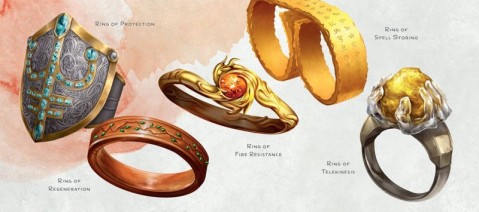 There is a persistent misunderstanding about buying and selling magic items in 5th Edition: that there’s no market for it. Certain people maintain that the Dungeon Master Guide specifically prohibits the existence of a magic item market, but this is, frankly, poor reading comprehension. Page 129-30 of the DMG says the following about selling magic items:
There is a persistent misunderstanding about buying and selling magic items in 5th Edition: that there’s no market for it. Certain people maintain that the Dungeon Master Guide specifically prohibits the existence of a magic item market, but this is, frankly, poor reading comprehension. Page 129-30 of the DMG says the following about selling magic items:
Few people can afford to buy a magic item, and fewer still know how to find one. Adventurers are exceptional in this regard due to the nature of their profession.
A character who comes into possession of a common, uncommon, rare, or very rare magic item that he or she wants to sell can spend downtime searching for a buyer. This downtime activity can be performed only in a city or another location where one can find wealthy individuals interested in buying magic items. Legendary magic items and priceless artifacts can’t be sold during downtime. Finding someone to buy such an item can be the substance of an adventure or quest.
The remainder of the section, entitled Selling Magic Items, goes on to provide a complex series of hoops necessary to sell your goods. I will go into further discussion of why this is easily the worst method below. Suffice it to say, a magic item market exists, it’s just harder to break into than in previous editions.
Part of the problem with selling magic items has to do with the paradox of their value and ubiquity. To illustrate how this can rapidly cause problems I would like to go back to everyone’s love-hate partner, 3rd Edition.
Suppose that you have established a lucrative company which employs wizards to summon Efreeti from the Elemental Plane of Fire who are then subdued and coerced into using their spell-like abilities (SLAs), as detailed on page 116 of the 3.5 Monster Manual. Once per day, every Efreeti your company has chained in a heavily guarded Planar Blocked room could be slapped around into granting three Wishes, each granting your organization their choice of the following:
- A nonmagical item of up to 25,000 gp in value.
- A magical item
Such an enterprise would immediately destabilize the global marketplace. Nonmagical items worth up to 25,000 gp would flood the market. Mighty fleets of three-masted warships could be conjured faster than new sailors could be trained to crew them. Currencies based on the intrinsic value of the precious metals they contain would become obsolete as tons of gold, silver, and platinum were simply created and melted down into bars for trade. Armies would have hundreds of archers each equipped with Composite Longbows (+249). Accidental death would be a thing of the past as diamonds worth 10,000 gp would be little more than shiny rocks whose sole application in society was to hand a cleric so they could Resurrect your loved one.
Additionally, an organization with Efreeti-powered mass production abilities would gain control of the entire magic market, and would shortly amass the capital to buy out all their competitors and establish a monopoly. Until, that is, another group of people managed to do the same. Then another. Then another. Magic items would eventually become ubiquitous and devalued, such that someone who couldn’t afford to get a new set of kitchen knives might simply grab one of the magic daggers hanging on the wall, stuffed under the floorboards, or propping up the wobbly table leg to finish preparing dinner. An attempt was made to balance this latter problem by imposing a limit on the value of magical items created by wish. The number 15,000 gp was chosen arbitrarily (incidentally, this is also the maximum value of currency rendered in platinum pieces that a creature such as a Balor can take with it when using its Greater Teleport SLA), and while it helps, it still leads to the same issues as experienced by mundane items. You could trade magic items worth 15,000 gp like nothing, but you’ll never find a magic item worth 15,001 gp available for cash. That kind of thing is rare, special; it sells for an altogether different kind of currency, like maybe “true love”, or even “your soul”. Cue the Faustian bargains.
Anyone with even an amateur knowledge of economics can see how this kind of system is completely flawed. A “market value” is a purely economic measure determined by supply and demand, and cannot serve as a reliable measure for the efficacy of magical abilities. And yet, this is exactly the same mistake that Wizards of the Coast has repeated in how they managed magic items in 5th Edition.
The first and most serious complication of using market value as a determining factor when dealing with magic items demonstrates just how little thought evidently went into the process of magic item creation in 5th Edition. Below are three charts provided in the Dungeon Master’s Guide for crafting and selling magic items:
Table 1-1: Crafting Magic Items
Item Rarity Creation Cost Minimum Character Level
Common 100 gp 3rd
Uncommon 500 gp 3rd
Rare 5,000 gp 6th
Very Rare 50,000 gp 11th
Legendary 500,000 gp 17th
Table 1-2: Salable Magic Items
Item Rarity Base Price d100 Roll Modifier
Common 100 gp +10
Uncommon 500 gp +0
Rare 5,000 gp -10
Very Rare 50,000 gp -20
Table 1-3: Selling Magic Items [simplified]
d100 + Mod. Result
<21 You find a buyer offering 1/10th base price.
21-40 You find a buyer offering 1/4 base price.
41-80 You find a buyer offering 1/2 base price.
81-90 You find a buyer offering full base price.
91+ You find a buyer offering 1.5 times base price.
It doesn’t take a genius to see the problem with this system. For the time and investment that it takes to create a magic item, there is minimal opportunity for making a profit. In fact, you’re more likely to take a loss in your sale than you are to even recoup what it cost you to create the item! So much for rewarding ingenuity. Consider the following cautionary tale before accepting this system:
Imagine that you have sought out the greatest masters to teach you the secrets of weaponsmithing. Braving primeval forest trails to reach elven sages and hunting dangerous monsters for crucial components for particular advanced spells, you have crafted a powerful sword. It is your single greatest achievement. You plan to sell this weapon at the annual market in the capital, where the wealthiest swordmasters will seek a blade worthy of their name. Your creation, a broadsword you have named Flame Tongue for its power to alight with crimson fire, is unique in this part of the world. You learned the secrets of its creation from the inscriptions on the wall of the lost forge of an ancient elven kingdom’s preeminent artificers. Crafting this weapon took the better part of a year and consumed your entire fortune. That’s fine, you think, because surely such a blade would be priceless in the eyes of a wealthy duke or prince.
You arrive at the fair on the first day. It will last but one week, and after that you will have to seek another market for your ware if you are unable to find a buyer. You roll first your Intelligence (Investigation) check to find a buyer. It’s a DC 20, and you roll 23. You then roll a d10 to determine how many days it will take to find this buyer. You roll a 6. Cutting it close, that’s the last day to sell in the market, as it will take you the remainder of today to set up your stall. You look to your other wares, swords of masterwork quality and perfect balance. They’re but essays in the craft; they will sell, but they won’t provide you the fame and fortune that you deserve. Now for the next most important roll. Your d% roll for determining the price you get offered. Your roll is 28. You also roll a Charisma (Persuasion) check and add the total to this. You roll a 16. Your total is 44, which is not bad, but then – because this is a very rare item you’re selling – you apply a -20 to the check, and you wind up with only 24. Damn.
Your prospective buyers are rather cheap. The foreign ambassador negotiating on behalf of the neighbouring kingdom’s crown prince offers you only 1,250 gp for the weapon – a quarter of what it cost to make this masterpiece! Your protests that its value is much greater fall on deaf ears; His Highness has only a meagre allowance while his father finances a costly war to protect his trade interests in the north. Perhaps another 250 gold can be offered, but full price is out of the question.
Crestfallen, you must refuse the offer. Not only is the weapon worth far more, so is your reputation and desired lifestyle. The new guildhall you planned to open will cost 5,000 gp alone, and you spend upwards of 7 or 8 gp a week maintaining a comfortable lifestyle while forging arms and armour to perfect your trade. The practical benefits of applying yourself toward mastering the crafting skills are, for the first time, seemingly useless. As you prepare to pack up your stall, however, you are approached by another man. His client – whose name is unimportant – has interest in the weapon. Your asking price means nothing now that you’ve received but one other offer. Any offer is better. Nonetheless, they’re willing to meet you halfway. A sum of 2,500 gp is offered to salvage your operation and keep you afloat, albeit at a loss. It’s only half the investment you made into crafting this weapon, but it’s enough to let you live comfortably and pursue other, less high-stakes endeavours. Perhaps shoeing horses, or forging standard weapons for a local petty lord. As it becomes apparent that this is the best offer you’ll get, your dreams of a large estate to retire on begin dwindling. You accept the offer with a heavy heart. The client pays in precious gems, diamonds and rubies. Most of them are, at least. When you have the stones appraised, three of them turn out to be elaborate fakes. That’s what you get for dealing with shady buyers. Your fortune has now dwindled to 2,000 gp, less than half your original fortune. Your foray into forging the mightiest weapons has left you in the red.
Obviously this is not an encouraging narrative, and it does not suit a game that moves from milestone to milestone in a constant string of accomplishments. Furthermore, if the magic item market is so minimal in this edition, newly crafted items are easily the most attractive commodities which would fetch truly outrageous markup prices.
With these considerations in mind, I have revamped Tables 1-1 and 1-3 to create more lucrative prospects for those who develop the highly precious ability to craft magic items.
Table 1-1: Crafting Magic Items (Revised)
Item Rarity Creation Cost Minimum Character Level
Common 25 gp 3rd
Uncommon 100 gp 3rd
Rare 1,000 gp 6th
Very Rare 10,000 gp 11th
Legendary 100,000 gp 17th
Table 1-3: Selling Magic Items (Revised)
d100 + Mod. Result
<21 You find a buyer offering 1/10th base price.
21-30 You find a buyer offering 1/4 base price.
31-40 You find a buyer offering 1/2 base price.
41-60 You find a buyer offering full base price.
61-70 You find a buyer offering twice the base price.
71-80 You find a buyer offering three times the base price.
81+ You find a buyer offering four times the base price.
Using this method, players who choose to invest their fortunes into a crafting endeavour will be far more likely to reap their deserved rewards. It would take poor business acumen to suffer a loss on something as valuable as a magic item with this improvement to the vanilla formula. Your players are sure to thank you.
Image credit: Wizards of the Coast (via D&D Adventurers League)
March 20, 2016 – This homebrew variant has been updated. See the PDF below (click the image link).
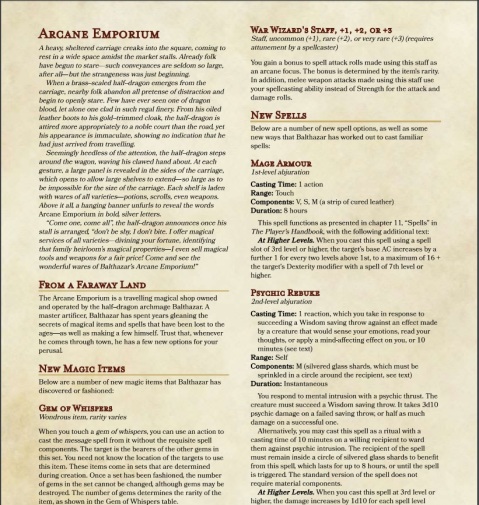
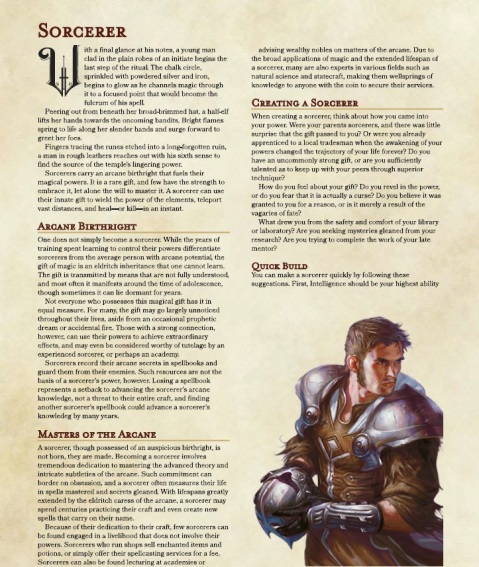
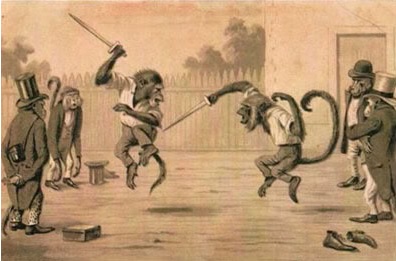
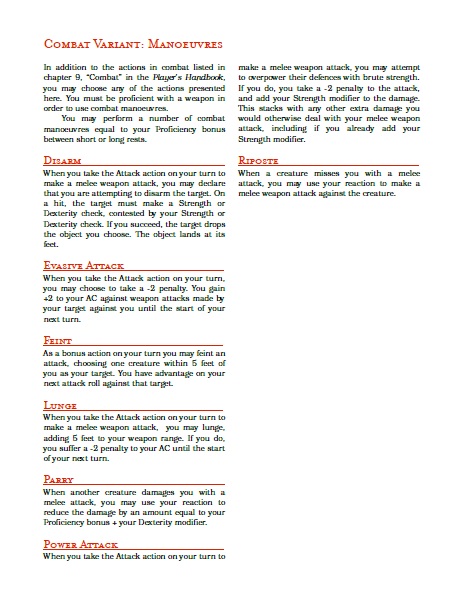
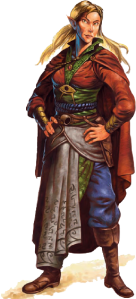
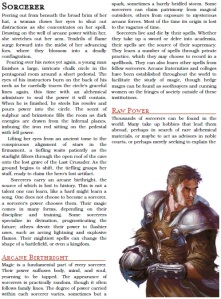
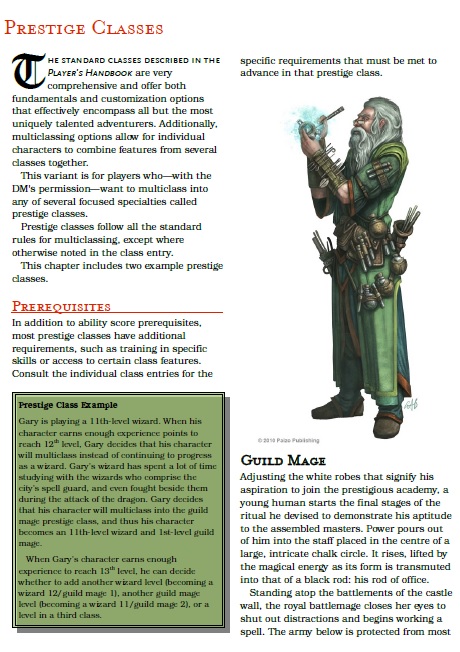

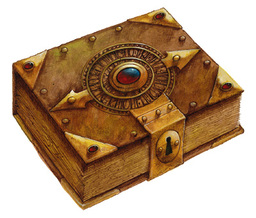
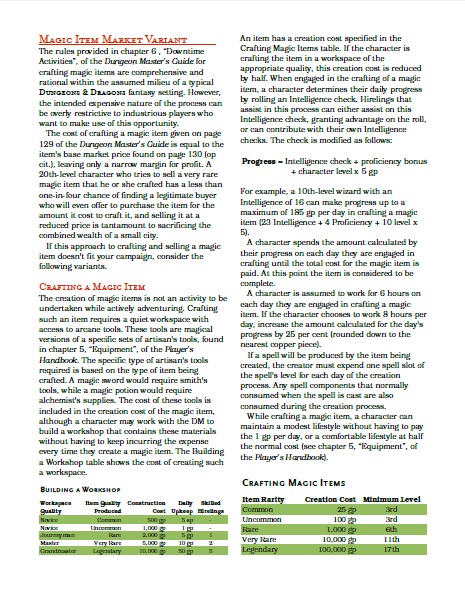
Recent Comments